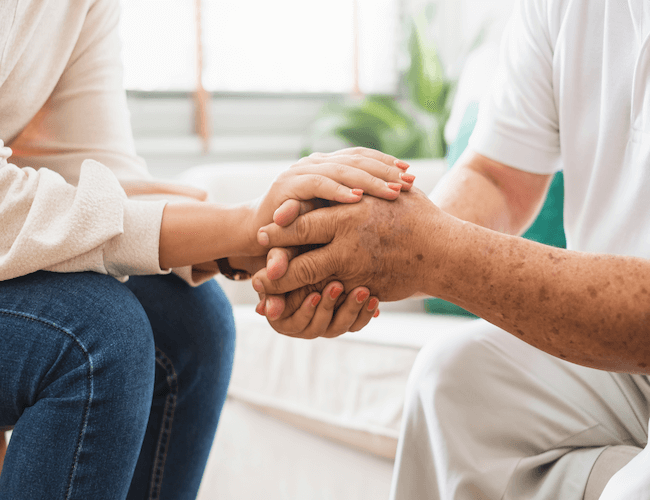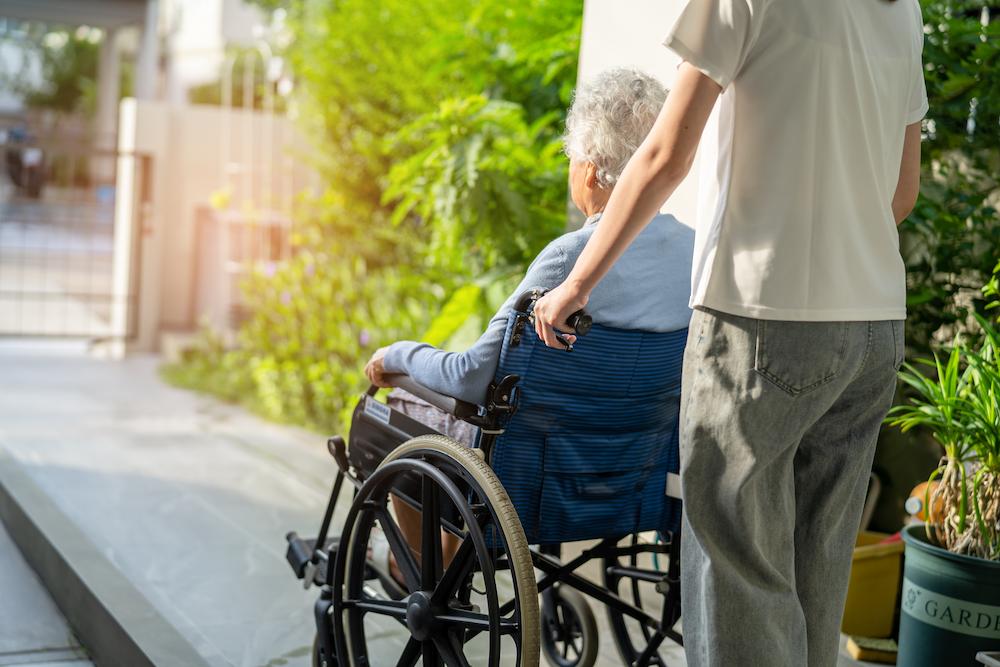What Are the Common Signs of Nursing Home Abuse and Neglect?
Signs of diminished well-being or low quality of life may be a sign of nursing home abuse or neglect. They could include physical signs, like bedsores, cuts, bruises, weight loss, unattended medical needs, frequent illness, or infection. Inadequate hygiene may also be a warning sign of nursing home abuse and neglect.
The victim might appear to be unbathed, clothes unwashed, with bad oral hygiene or hair care. Even if no physical signs indicate the abuse, mental signs may be more prominent. The victim may be withdrawn or prone to mood swings. In addition, sudden changes in the victim’s financial situation may indicate exploitation by nursing home caregivers.
Why Should I Consult With a Nursing Home Abuse Attorney?
Nursing home abuse and neglect is unfortunately common. Legal protections exist to shield senior citizens from these abuses, but as with any legal ecosystem, these cases can be complicated. Court proceedings may also be intimidating for families seeking justice for their elderly loved ones. The defendant gets to counter your case, and with the right counsel, even clear-cut cases of nursing home abuse can go the way of the defendant.
An attorney experienced in nursing home abuse and neglect will be your trusted expert counselor and guide through the sometimes twisty process of winning just recompense for the harm done by nursing home abuse. Your attorney champions your cause, doing the heavy legal lifting so you don’t have to.
How Can Cohen, Feeley, Altemose & Rambo Help With Nursing Home Abuse and Neglect Cases?
At Cohen, Feeley, Altemose & Rambo, we can help you prepare and file your lawsuit and build the strongest case possible for your claim of nursing home abuse or neglect. We can help you gather and secure evidence to be entered into the court record, present your case, and anticipate counterarguments from the defendant(s) so we can effectively counter them. If a deposition or testimony is needed, we can help you prepare for that sometimes intimidating process.
Why Should I Choose Cohen, Feeley, Altemose & Rambo for My Nursing Home Abuse and Neglect Case?
At Cohen, Feeley, Altemose & Rambo, our law firm has extensive experience representing aggrieved parties and getting them the justice they deserve. We have a special passion for nursing home abuse and neglect cases, considering it an egregious offense against some of the least deserving victims imaginable.
As such, we aggressively represent our elder neighbors in Bethlehem who have fallen victim to nursing home abuse and neglect, tenaciously seeking maximum damages. This is how we have built the
impressive track record of:
Over Half a Billion Dollars in Settlements Recovered for Our Clients
$95 Million: Highest Verdict Obtained
25+ Years of Experience in Nursing Home Abuse & Neglect Cases
How Can I Get Started With Cohen, Feeley, Altemose & Rambo for My Nursing Home Abuse Case?
It is easy to get a nursing home abuse case started with Cohen, Feeley, Altemose & Rambo. Simply give us a call or fill out our
contact form to schedule your free, no-obligation consultation. A representative will listen to you and walk you through the first steps of holding a neglectful nursing home accountable.
How Serious of a Problem Is Elder Abuse in Nursing Homes?
It is hard to know exactly how prevalent elder abuse and neglect in nursing homes is, as the practice is reputed to be severely under-reported — something the team at Cohen, Feeley, Altemose & Rambo aims to change.
The stats available to us are distressing enough:
The World Health Organization (WHO) estimated that one in six people over the age of 60 had been abused in a community setting within the last 12 months.
In the U.S., it is believed that one in 10 elders experience abuse, but only one in 14 cases are reported.
When asked, more than 50% of all surveyed employees at nursing homes admitted to some form of mistreatment of their charges within the past year, including neglect, physical abuse, or mental abuse.
What Are the Causes of Nursing Home Abuse or Neglect?
There is no universal cause of nursing home abuse or neglect. It can manifest due to a myriad of factors, ranging from understaffing and inadequate training to subpar hiring practices and poor facility management.
Another contributing factor is the vulnerability of many nursing home residents, who may have limited mobility and medical dependencies. Unfortunately, some individuals with malicious intent target these vulnerable populations, viewing them as easier victims for exploitation.
What Are the Different Types of Elder Abuse and Neglect?
A variety of harmful actions qualify as elder abuse and neglect under the law. These may include:
Physical abuse
Emotional or psychological abuse
Isolation
Withholding of medication or treatment
Sexual abuse
Financial exploitation
Abandonment
Neglect of basic needs (food, hygiene, etc.)
What Is an Example of Neglect in a Nursing Home?
Look for signs of physical abuse, such as cuts and bruises, as well as signs of neglect — pressure sores, infections, poor hygiene, weight loss, etc. Also look for changes in temperament, including moodiness or withdrawn behavior. Watch the behavior of caregivers for signs of callousness.
What Kinds of Nursing Home Abuse and Neglect Cases Do We Handle?
Cohen, Feeley, Altemose & Rambo handles any kind of nursing home abuse or neglect case allowed under the law. If the victim has suffered physical, mental, or emotional abuse, we will work to secure damages for pain and suffering, as well as reimbursement for any medical expenses. If the victim has been financially exploited, we can also secure restitution of lost funds.
How Can You Prevent Your Loved One From Becoming a Victim of Nursing Home Abuse or Neglect?
Preventing a loved one from becoming the victim of nursing home abuse or neglect requires that you be vigilant and assertive on their behalf. Carefully vet nursing homes for their reputation, hiring practices, policies, monitoring and accountability systems, and history of resident treatment.
Once your loved one has moved in, remember to visit frequently. If possible, drop in unannounced and be wary of any notices that you can’t visit your loved one for hard-to-understand reasons. When you do see your loved one, look for telltale signs of abuse, including but not limited to obvious signs of physical abuse, weight loss or malnourishment, inadequate hygiene and grooming, mood swings, or withdrawn behavior.
What Should You Do if You Suspect Abuse or See Your Loved One Being Abused?
First, collect all documentation to support your suspicions. Don’t give the nursing home the chance to circle the wagons before you have secured possible evidence.
As soon as possible, report your suspicions to the provider. They may genuinely want to hear about it and correct it, especially if the incident was the result of a rogue caregiver instead of institutional deficiency.
If necessary, however, be prepared to immediately contact law enforcement and secure legal counsel from
Bethlehem personal injury lawyers experienced in elder abuse and neglect case law.
How Does the Law Protect Nursing Home Residents From Abuse?
The law sets standards for the care and treatment that nursing homes must render to their residents. Failing to uphold those standards makes the nursing home liable for civil damages paid to the victim, as well as potential criminal penalties.
What Are the Standards of Care Required by Law of Nursing Homes?
The Federal Nursing Home Reform Act, which is part of the Omnibus Budget Reconciliation Act (OBRA) of 1987, includes provisions that specify a bill of rights for nursing home residents. These rights are outlined in Section 483.10 of the Code of Federal Regulations (42 CFR § 483.10).
Under this federal law, nursing homes that participate in the Medicare and Medicaid programs are required to protect and promote the rights of each resident. The Resident's Bill of Rights established by the Federal Nursing Home Reform Act includes a range of rights and protections for residents living in long-term care facilities. Some of the key rights outlined in the Act include:
The right to be free from abuse, neglect, and exploitation.
The right to privacy and confidentiality of personal and medical information.
The right to participate in one's own care and treatment decisions.
The right to be treated with dignity and respect.
The right to voice grievances without fear of retaliation.
The right to have a choice in activities, schedules, and healthcare providers.
The right to be free from unnecessary restraints.
The right to access one's own medical records.
The right to participate in family groups.
The right to be fully informed about one's health status, treatment, and medications.
Are There Any Laws to Protect Senior Citizens in Pennsylvania?
In Pennsylvania, the Department of Aging is responsible for the oversight and implementation of the Older Adults Protective Services Act (OAPSA) for individuals over the age of 60. OAPSA is aimed at preventing abuse, neglect, exploitation, and abandonment of older adults in Pennsylvania, by establishing reporting requirements and legal protections.
OAPSA establishes a framework for providing protective services to older adults who are at risk of abuse or neglect, which may include medical assessments, counseling, and legal assistance. The Act also provides legal protections and immunity from civil and criminal liability to individuals who make good faith reports of suspected abuse or neglect. This encourages reporting without fear of retaliation.
What Kind of Compensation Can You Get in a Nursing Home Abuse and Neglect Case?
Medical expenses are often awarded to cover the cost of treatment related to injuries, such as hospital stays, surgeries, and ongoing care. Victims can also claim pain and suffering for the emotional effects of the abuse, as well as mental anguish, which compensates for psychological trauma like anxiety or PTSD.
If the victim's quality of life is significantly reduced, compensation for loss of enjoyment of life may be granted. In cases of extreme or malicious misconduct, punitive damages may be awarded to punish the nursing home and deter future wrongdoing.
If the abuse leads to a resident's death, the family can seek wrongful death damages, which may cover funeral costs and emotional losses. Victims requiring rehabilitation, such as physical therapy or counseling, may also receive compensation for those costs.
Should a family need to relocate their loved one due to unsafe conditions, the cost of relocation can be covered. If financial abuse occurred, compensation for financial losses can help recover stolen money or assets.
Identifying all the economic and non-economic damages in a civil case can be complicated. A first-rate nursing home neglect lawyer in Bethlehem has experience in this. They are used to investigating and calculating these numbers.
Why Don’t the Elderly Report Abuse, and What Can You Do About It?
Many senior citizens fail to or decline to report abuse because they fear retaliation or embarrassment. Some may be impaired in their ability to communicate. Abusive nursing homes can wield significant control over their residents’ movement, communication, comfort, and access to the outside world.
Can I Sue a Nursing Home for Abuse and Neglect?
It is appropriate to consider legal action against a nursing home when you have reason to believe that the facility has failed in its duty to provide a safe, clean, and respectful living environment for residents. If your loved one has suffered physical, emotional, or financial harm due to negligence or abuse within the nursing home, pursuing a lawsuit can be a way to seek justice and hold those responsible accountable for their actions.
To determine the appropriateness of a lawsuit, you should consult with an experienced attorney who is experienced in handling nursing home abuse and neglect cases, like the ones at Cohen, Feeley, Altemose & Rambo. We can help assess the details of your situation and provide guidance on the best course of action to protect your loved one's rights and well-being.
What Evidence Do You Need for a Nursing Home Abuse and Neglect Case?
In order to pursue a case, evidence is essential. Talk to a nursing home abuse and neglect lawyer in Bethlehem about what kind of evidence to be on the lookout for.
These include the following:
Medical records of treatment for injuries
Photographs and videos of bruises or injuries
Witness statements
Care facility records
Bills and financial records in the case of financial abuse
Communication and correspondence between employees
State inspection reports
Who Can Bring a Lawsuit for Elder Abuse or Neglect?
In cases of elder abuse or neglect, most lawsuits are officially initiated by the victim themselves or their family members. However, if the victim is not in a position to take legal action, a family member or trusted individual may serve as an appointed legal guardian or conservator to pursue the lawsuit on their behalf. If the victim is deceased, their Estate will generally be the plaintiff. The specifics of who can bring a lawsuit may vary depending on the jurisdiction and the circumstances of the case.
It is important to consult with qualified
personal injury attorneys who specialize in elder abuse and neglect cases to understand the legal requirements and options available for bringing a lawsuit in your particular situation. They can provide valuable guidance on the appropriate steps to take to seek justice and protect the rights of the affected individual.
How Long Do You Have To Sue a Nursing Home in Pennsylvania?
In Pennsylvania, the statute of limitations for filing a nursing home abuse or neglect case is generally two years from the date the injury occurred. If you don’t file before the two years are up, your case may be dismissed. However, there are a few exceptions to this rule.
If the harm wasn't immediately apparent and was discovered later (such as in cases of hidden neglect or abuse), the clock may start running from the date you discovered the abuse. However, if the abuse or neglect resulted in a
wrongful death, the statute of limitations for filing a wrongful death claim is typically two years from the date of death.
Since elder abuse is not always discovered immediately, this can make deadlines a bit more complex. Reach out to a nursing home abuse lawyer in Bethlehem to review your individual case, and so they can help you file one time.
How Do I Report Nursing Home Neglect in PA?
If you suspect abuse or neglect in a nursing home setting, it is crucial to act expeditiously and methodically to protect the well-being and legal rights of the affected individual. As a law firm specializing in elder law, we advise you to follow these steps:
Compile Detailed Documentation: Carefully collect all relevant evidence that supports your suspicions of abuse or neglect. This can include medical records, photographs of injuries or unsanitary conditions, as well as any pertinent witness statements.
Formal Reporting to the Nursing Home's Management: Submit a formal, written report outlining your concerns to the nursing home's administrative team. Ensure that you retain copies of all communication, and request a formal acknowledgment of your submitted report for your records.
Contact Relevant Government Agencies: If the situation is not adequately addressed by the nursing home's management, or if immediate intervention is necessary, reach out to the Department of Health or Adult Protective Services, and/or local law enforcement agencies.
Seek Legal Consultation: Should you anticipate the need for legal action, consult with the experienced team at Cohen, Feeley, Altemose & Rambo. We will help preserve all available legal remedies and protect the rights of the individual involved.






